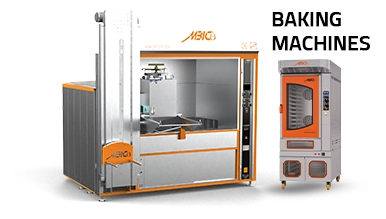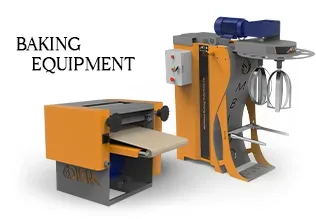Articles
Mastering Bulk and Semi-Bulk Breads: A Scientific Approach with MBICO Equipment
As a professional baker who has dedicated years to mastering the transformation of simple ingredients into community staples, I recognize that scaling production presents the ultimate test of skill and precision. It is one thing to bake an exceptional artisan loaf; it is another to produce thousands of substantial, high-quality loaves—what we define as bulk and semi-bulk breads—with unwavering consistency, day after day.
These large-scale operations—handling everything from proud baguettes and comforting sandwich breads to traditional favorites like Barbari—introduce unique variables that challenge even the most experienced teams. Success demands more than intuition; it requires a deep scientific understanding of dough mechanics and, critically, industrial-grade precision in your machinery. Without robust and intelligently designed bakery equipment, achieving quality consistency across massive batches is virtually unattainable.
This is where technical expertise and trusted manufacturing intersect. MBICO (Mashhad Baking Industries), a cornerstone of the professional baking industry, provides the necessary machinery to bridge the gap between traditional craft and high-volume demand. Drawing from my own operational experiences in busy bakeries, this introduction sets the stage for mastering this critical phase of the business, outlining the scientific principles and practical tips that, when combined with reliable equipment, guarantee quality and efficiency at scale.
related products: Bulk bread baking Ovens
Understanding the Science of Volume
Baking bulk and semi-bulk breads isn’t just about multiplying a home recipe. The increased mass of dough alters the fundamental processes:
- Thermal Dynamics in a Larger Mass: Heat penetration is a baker’s constant consideration. In a large loaf or multiple loaves baked close together, the time it takes for heat to reach the center is significantly increased. This slower heat transfer means the outer crust is exposed to radiant and convective heat for a longer period. Without precise control, this leads to an over-thick or burnt crust while the interior struggles to reach the gelatinization temperatures needed for a fully set crumb and the thermal kill point for yeast and enzymes. I recall a particularly frustrating period where seemingly perfect loaves emerged from the oven, only to reveal disappointingly dense, undercooked centers upon slicing. The issue? Insufficient heat penetration to the core within the bake time dictated by the crust.
- Managing Fermentation Kinetics: Yeast activity generates heat. In a large dough mass undergoing bulk fermentation or proofing, this metabolic heat builds up more readily in the interior than in smaller loaves. This can create internal temperature variations, accelerating fermentation in the core and potentially leading to uneven development, or worse, over-proofing before the exterior signals readiness. Controlling dough temperature throughout the process becomes paramount to ensure uniform fermentation activity.
- Structural Integrity of a Heavier Load: The gluten network in bulk and semi-bulk doughs bears a greater physical load due to the sheer weight of the dough. Developing a strong yet extensible gluten structure is vital to support the dough’s expansion during proofing and the explosive “oven spring” in the initial stages of baking. A weak structure will collapse under the weight, resulting in a flat, dense loaf. Achieving this strength requires efficient and proper mixing without overworking the dough, which can damage the gluten.
The Essential Equipment for Bulk and Semi-Bulk Production
Attempting to bake bulk and semi-bulk breads with inadequate equipment is like trying to build a house with hand tools alone – it’s possible, but inefficient, inconsistent, and incredibly challenging. MBICO specializes in providing the right tools for this scale:
- Spiral Mixers: The Power and Precision for Large Doughs. For bulk bread production, a spiral mixer is non-negotiable. Its design, with a rotating bowl and a spiral hook, mimics hand kneading but on a much larger scale and with far greater consistency and efficiency. This action develops the gluten structure gradually and effectively throughout the entire dough mass, crucial for the strength required by large loaves. The controlled mixing minimizes friction and heat buildup, helping maintain optimal dough temperature. I’ve seen firsthand the transformation from struggling with overtaxed smaller mixers to the smooth, consistent dough produced by a well-sized spiral mixer – it’s the foundation of a successful batch. MBICO’s spiral mixers are built to handle significant capacities, providing the power and control needed for consistent dough development, batch after batch.
- Deck Ovens with Humidifiers: The Ideal Baking Environment. Deck ovens are the workhorse of bulk and semi-bulk bread baking. Their stone or ceramic decks provide excellent conductive heat, essential for a strong bottom crust and initial oven spring. The enclosed environment allows for precise temperature control and, critically for these bread types, the effective use of steam. MBICO’s deck ovens are renowned for their robust construction and, importantly, their capacity for generating ample steam. Steam on the oven explains what happens to the dough’s surface during the initial phase of baking. It keeps the crust soft and extensible, allowing the loaf to expand fully before the crust sets. This maximizes oven spring and contributes to a thinner, crispier crust and better volume. Without sufficient steam, especially for breads like baguettes or those requiring significant expansion, the crust sets too early, restricting the rise and potentially causing the loaf to burst unpredictably. The consistent, even heat and powerful steam injection capability of MBICO’s deck ovens directly addresses the heat transfer challenges of large loaves, ensuring they bake through evenly with beautiful crust development.
- Dough Proofers: Creating the Perfect Climate for Rise. Consistent proofing is as vital as consistent mixing and baking. For bulk and semi-bulk doughs, which have longer fermentation times, a controlled environment is essential. Dough proofers from MBICO provide precise control over temperature and humidity, creating the ideal conditions for yeast activity. This eliminates the guesswork and inconsistency of ambient proofing, especially in environments with fluctuating temperatures. Proper proofing ensures the dough develops the right volume and internal structure before baking, preventing issues like dense crumb from under-proofing or collapsed loaves from over-proofing. MBICO’s proofers are designed to accommodate the trays and racks used in volume production, ensuring that every loaf proofs uniformly.
Hard-Earned Tips for Baking at Scale
Beyond the machinery, experience teaches valuable lessons:
- Master Dough Temperature: Always use a thermometer to check your dough temperature after mixing. Adjusting water temperature is your primary tool for controlling the rate of fermentation, which is crucial for large batches.
- Respect Bulk Fermentation Time: Don’t rush bulk fermentation. Allow the dough to develop flavor and strength over the recommended time, observing its activity rather than just following a clock rigidly.
- Handle with Care During Dividing and Shaping: While the dough is strong, large pieces are heavy. Use proper techniques to divide and shape gently but effectively, preserving the developed gluten structure and creating the necessary surface tension for a good bake.
- Score with Confidence: Especially on larger loaves and baguettes, confident, well-executed scores are vital. They guide the expansion of the loaf and are key to achieving the desired shape and oven spring.
- Utilize Oven Space Efficiently: Understand the hot and cool spots in your deck oven (if any) and rotate loaves for even baking if necessary, although good quality deck ovens minimize this need.
- Cooling is Part of the Bake: Large loaves take a significant amount of time to cool. Resist the urge to cut them too early. Proper cooling on racks allows internal moisture to redistribute and the crumb structure to set fully. Cutting too soon results in a gummy texture.
Embarking on Your Bulk Baking Journey
If you’re ready to scale up your bread production and delve into the rewarding world of bulk and semi-bulk breads, partnering with a reputable equipment manufacturer like MBICO is a smart first step.
- Assess Your Production Goals: How much bread do you need to produce daily or weekly? This dictates the capacity of the equipment you’ll need – from mixer size to the number of deck oven levels.
- Invest Wisely: High-quality, durable equipment is an investment that pays dividends in consistency, efficiency, and longevity. MBICO’s reputation in the industry speaks to the quality of their machinery.
- Educate Yourself: Learn the science behind scaling recipes and the specific techniques required for the types of bulk breads you want to bake.
- Practice and Refine: Baking at scale requires practice. Start with manageable batch sizes and refine your process as you grow.
As the renowned baker and author M.F.K. Fisher beautifully put it, “The smell of good bread baking, like the sound of lightly flowing water, is indescribable in its evocation of innocence and delight.” Producing bulk and semi-bulk breads allows you to spread that delight more widely, bringing the simple pleasure of good bread to many tables.
And remember the words of the great Louis Bromfield: “Bread is the king of the table and all else is merely the court that surrounds the king.” By mastering the art and science of baking bulk and semi-bulk breads with the support of reliable equipment from MBICO, you are truly enthroning the king of foods.
Baking at volume is a demanding but incredibly fulfilling pursuit. With the right understanding of the scientific principles and the support of expertly engineered equipment from MBICO, you are well-equipped to produce exceptional bulk and semi-bulk breads that will be the pride of your bakery and the delight of your customers.







Explore MBICO's categories
Bakery equipment
13 Products
bulk and semi-bulk bread baking ovens
3 Products
Bulk Breads Baking equipment
14 Products
Confectionery equipment
7 Products
Mini ovens
3 Products
Pizza and food ovens
4 Products
Baking equipment
25 Products
Bakery oven
5 Products
Tafton baking ovens
3 Products
Barbari baking ovens
4 Products
Sangak bakery ovens
3 Products
Lavash baking ovens
3 Products
Pastry and confectionery ovens
3 Products
Baking ovens
10 Products
Mobile baking machines
4 Products
Explore MBICO's products
Mini Deck Oven
Convection Oven
Portable Rotary Semi-Automatic Oven for Baking Sangak Bread
Mobile Kitchen Container
Dough Rolling Machine
Dough Mixer with removable Bowl
Fixed Rotary Semi-Automatic Oven for Baking Traditional Breads
Bread & Sugar Grinder